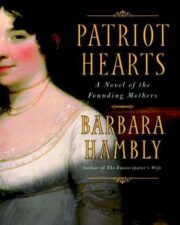“Watch me, Mama!” Payne kicked his mount into a canter, effortlessly cleared a fallen tree-trunk near the road, and flourished his hat to his mother’s applause.
“I’ve jumped him over fences, too,” the boy said, trotting back to the carriage. “Jeff and I, we took out Annie’s horse back at Edgehill, and there wasn’t any trouble. I’m big enough to have a horse of my own, not a pony. Annie’s only a few months older than me, and she has a horse. You have to tell Papa I’m big enough.”
Dolley pretended to frown in concentration. “I’m to tell thy papa thou’rt big enough to be a horse-thief? Well, all right…”
He crowed with laughter, and swiped the air with his riding-whip. “You know what I mean!” And cantered ahead to jump the little creek, singing as he rode.
Fair as Dolley’s sister Lucy, and with the promise of Lucy’s good looks and their father’s height, Payne had slipped easily into the role of a planter’s son. Maybe too easily, Dolley thought. John Todd had believed devoutly in education, not simply because his own father was a schoolmaster but because he saw learning as the gateway to an honorable career. And Jemmy, of course, was one of the most erudite men in Virginia.
But from the moment Payne had realized that his stepfather was a wealthy planter, with ten thousand acres and over a hundred slaves at his beck and call, he seemed to have understood that the issue of his future livelihood was already taken care of. And as the years had passed and Dolley had realized, first with disbelief and then with an agony of regret, that Jemmy’s seed could find no root in her womb, it had become harder and harder for her to discipline Payne, or to endure his sullen wretchedness on those few occasions when his will was thwarted. During one of those miserable battles of will when he was five—Dolley recalled it was over his first pony—he had sobbed, You wish I’d died so you could marry Papa! Papa being Jemmy. The words, and the way he’d turned from her, had gone like a knife-blade into her heart.
In all other things, Dolley believed herself to be fairly rational: firm with the slaves, since there was no keeping house unless one learned to be firm; tactful with her tribe of new sisters-in-law; adept at balancing the demands of running a plantation household against the constant stream of Virginia hospitality and her own need for a quiet hour now and then.
But with Payne she was helpless.
It was a good thing, she reflected, that the boy was so good-hearted. She had been less concerned during the first two years of her marriage, when she and Jemmy had wintered in Philadelphia every year for the sessions of Congress. Payne had had his familiar friends around him. Only in the summers had they returned to the relative isolation of Montpelier, where Payne’s only company was the children of either slaveholders or slaves.
But in 1797, so many things had changed.
The vicious Presidential election of 1796 had gone to Adams by three electoral votes. And because the Constitution had been written before the emergence of distinct political parties—not to mention before such events as the bloody Revolution in France and England’s ruthless decision to seize American ships, cargoes, and seamen—Thomas Jefferson had emerged from retirement to become Vice President to his former friend, whose political views were now in direct opposition to his own. (“One can’t think of everything,” Jemmy had sighed.)


"Patriot Hearts: A Novel of the Founding Mothers" отзывы
Отзывы читателей о книге "Patriot Hearts: A Novel of the Founding Mothers". Читайте комментарии и мнения людей о произведении.
Понравилась книга? Поделитесь впечатлениями - оставьте Ваш отзыв и расскажите о книге "Patriot Hearts: A Novel of the Founding Mothers" друзьям в соцсетях.